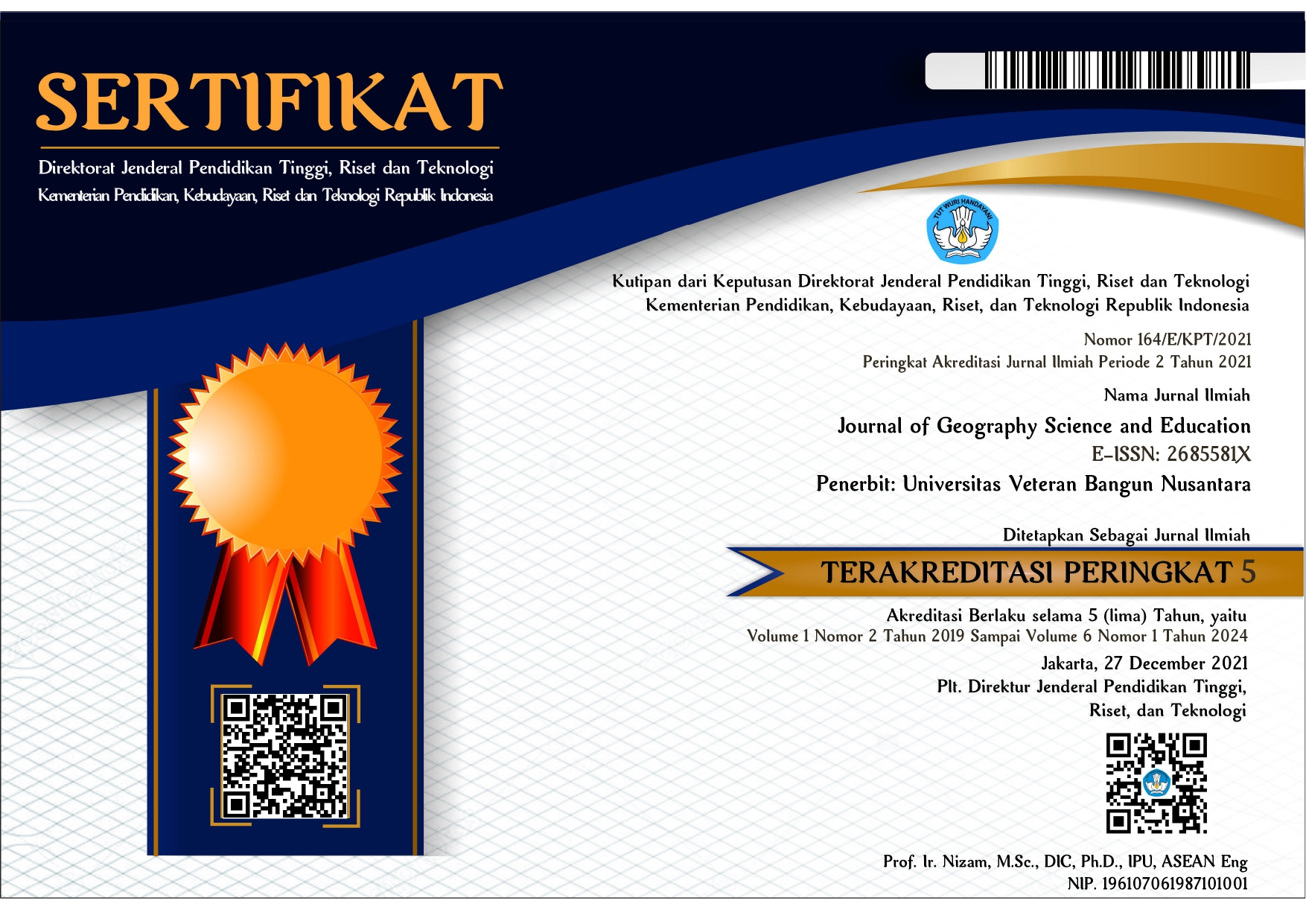Student Perception of School Health Environment in SMA 2 State Unggulan Talang Ubi Regency Pali
DOI:
https://doi.org/10.32585/jgse.v2i1.829Abstrak
Lack of student awareness about the importance of environmental health causes school hygiene to become unhealthy. To find out students' perceptions about the health of the school environment in SMA Negeri 2 Unggulan Talang Ubi, Pali Regency.
The method used in this research is descriptive qualitative method. The population in this study all class X students in SMA Negeri 2 Talang Ubi Pali Regency, amounting to 157 people. Determination of the sample using a random sampling technique where individuals selected randomly into a sample of 30 people from all grade X students in SMA Negeri 2 Unggulan Talang Ubi, Pali Regency. Data collection techniques used in this study were observation, documentation and questionnaires. The validity of the data used in this study is triangulation of data collection techniques by checking data to the same source with different techniques to get data from the same source and analyze data using the percentage formula.
Based on the results of research that has been carried out to determine students' perceptions about school environmental health in SMA Negeri 2 Featured Talang Ubi in Pali Regency related to knowledge, understanding, attitudes and behavior of school environmental health by 75% have the perception that school environmental health is very important to maintain and creating environmental hygiene and health needs student self-awareness that starts with personal hygiene because if the school environment is not clean and healthy, disease transmission can occur through environmental media.
Unduhan
Referensi
Arikunto, Suharsimi. 2010. Prosedur Penelitian Suatu Pendekatan Praktik. Jakarta: Rineka Cipta.
Ayu Agres Lestari. 2015. Persepsi Siswa Tentang Kesehatan Lingkungan Sekolah Di SMA Negeri 2 Unggulan Talang Ubi Kabupaten PALI Tahun Ajaran 2015/2016. (artikel jurnal). Palembang: Fakultas Keguruan dan Ilmu Pendidikan Universitas Persatuan Guru Republik Indonesia.
Hermawan, Yoni dan Ikhsan, Komara Nur.2011.Pengaruh Penyuluhan Kesehatan Lingkungan Terhadap Tingkat Pengetahuan dan Pelaksanaan Kesehatan Lingkungan SMP Negeri Tambaksari Kecamatan Tambaksari Kabupaten Ciamis.166-169.
Riduwan, 2009.Rumus dan Data dalam Analisis Statistika. Bandung: Alfabeta.
Singarimbun, Masri dan Safiah Efendi. 2006. Metode Penelitian Survai. Jakarta Barat: Pustaka LP3ES Indonesia, Anggota IKAPI.
Slameto.2010. Belajar Dan Faktor-Faktor Yang Mempengaruhinya. Jakarta: Rineka Cipta.
Soemirat, Juli. 2011. Kesehatan Lingkungan. Yogyakarta: UGM Press.
Sudjiono, Anas. 2009. Statistik Pendidikan. Bandung: Alfabeta.
Sugiyono.2010 Metode Penelitian Pendidikan. Bandung: Alfabeta.
Sugiyono. 2010. Memahami Penelitian Kualitatif. Bandung: Alfabeta.
Walgito, bimo. 2010. Psikologi umum. Yogyakarta: CV. Andi Offset.
Unduhan
Cara Mengutip
Terbitan
Bagian
Lisensi
License and Copyright Agreement
In submitting the manuscript to the journal, the authors certify that:
- They are authorized by their co-authors to enter into these arrangements.
- The work described has not been formally published before, except in the form of an abstract or as part of a published lecture, review, thesis, or overlay journal. Please also carefully read JGSE's Posting Your Article Policy at http://pubs2.ascee.org/index.php/ijele/about/editorialPolicies#custom-5
- That it is not under consideration for publication elsewhere,
- That its publication has been approved by all the author(s) and by the responsible authorities – tacitly or explicitly – of the institutes where the work has been carried out.
- They secure the right to reproduce any material that has already been published or copyrighted elsewhere.
- They agree to the following license and copyright agreement.
Copyright
Authors who publish with Journal of Geography Science and Education agree to the following terms:
- Authors retain copyright and grant the journal right of first publication with the work simultaneously licensed under a Creative Commons Attribution License (CC BY-SA 4.0) that allows others to share the work with an acknowledgment of the work's authorship and initial publication in this journal.
- Authors are able to enter into separate, additional contractual arrangements for the non-exclusive distribution of the journal's published version of the work (e.g., post it to an institutional repository or publish it in a book), with an acknowledgment of its initial publication in this journal.
- Authors are permitted and encouraged to post their work online (e.g., in institutional repositories or on their website) prior to and during the submission process, as it can lead to productive exchanges, as well as earlier and greater citation of published work.
Licensing for Data Publication
Journal of Geography Science and Education use a variety of waivers and licenses, that are specifically designed for and appropriate for the treatment of data:
- Open Data Commons Attribution License, http://www.opendatacommons.org/licenses/by/1.0/ (default)
- Creative Commons CC-Zero Waiver, http://creativecommons.org/publicdomain/zero/1.0/
- Open Data Commons Public Domain Dedication and Licence, http://www.opendatacommons.org/licenses/pddl/1-0/
Other data publishing licenses may be allowed as exceptions (subject to approval by the editor on a case-by-case basis) and should be justified with a written statement from the author, which will be published with the article.
Open Data and Software Publishing and Sharing
The journal strives to maximize the replicability of the research published in it. Authors are thus required to share all data, code or protocols underlying the research reported in their articles. Exceptions are permitted but have to be justified in a written public statement accompanying the article.
The associated persistent identifiers (e.g. DOI, or others) of the dataset(s) must be included in the data or software resources section of the article. Reference(s) to datasets and software should also be included in the reference list of the article with DOIs (where available). Where no domain-specific data repository exists, authors should deposit their datasets in a general repository such as ZENODO, Dryad, Dataverse, or others.
Small data may also be published as data files or packages supplementary to a research article, however, the authors should prefer in all cases a deposition in data repositories.










